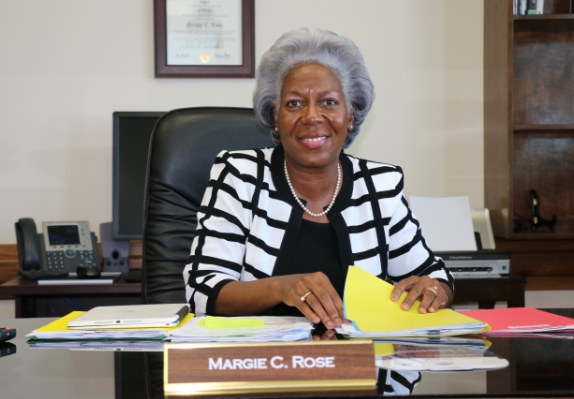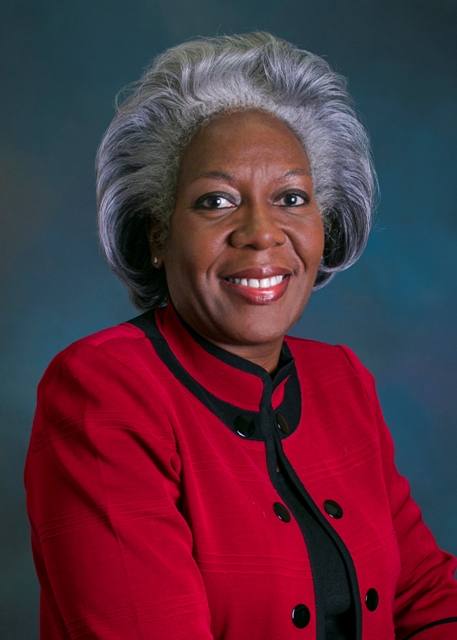[spacer height=”20px”]
[spacer height=”20px”]
Margie Rose started her life in the tiny town of Screven, Georgia. This small railroad community in Wayne County is known for hunting, fishing, and annual festivities. The true Southern hospitality of the town with less than 700 people buried itself deep in Margie’s soul and served her well on her journey to becoming the city manager of Corpus Christi, Texas.
“I am what you call a true Southerner, and I am really proud of that,” Margie said. “In Georgia, everybody’s a friend. You say ‘hello’ to everyone. It’s just part of Georgia.”
When Margie was eleven, her parents moved her and her two brothers to Michigan. There she greeted everyone she met in her usual, Southern way, but she quickly noticed that the people in this state bordering the Great Lakes were not like the people of her childhood home. She asked her mother why no one would return her greeting. Her mother made excuses for the people in Michigan, saying that it was a different environment from Screven, but that answer only made Margie more aware of the importance of her Southern upbringing.
“I still thought that smiling and saying ‘hello’ was not costly at all,” said Margie, so she carried on spreading her Southern hospitality to those she encountered.
The school she attended, which had a population nearly equal to her hometown, had a program that would change the course of Margie’s life. This program allowed seniors who had earned all of their credits by December of the graduating year to opt out of taking classes the second semester. The counselor surprised this National Honor Society student with the news that she had met the requirements for the program. Margie was taken aback when asked if she might be interested in taking a job with the City of Inkster, Michigan, in the six months before high school graduation.
“I had no idea what to say! I had never worked because my mother wanted me to focus on school. There I was at seventeen trying to make a big decision, so I told her I would have to talk to my parents to see what they thought I should do,” she said. The counselor told Margie to go home, talk to her parents, and return to her office the next day so that she could set up an interview with someone from the city. Margie admitted that she got excited about the possibility of embarking on a new adventure in her life and had no idea what to expect when she landed the job.
“I was basically a cashier who was dealing mainly with senior citizens,” said Margie. “They would come in to pay their taxes, and some of them were angry about the amount they had to pay.” Their complaints drove her to learn all she could about how taxes are created in order to better serve the people who came to her looking for answers. Margie frequented the assessor’s office during this time.
“I just felt so good communicating with the people. It was the first time I realized how my Southern hospitality came out when I was serving them. And even though they were angry, I still accepted and listened to them. That time between January and June really changed me,” said Margie.
Working in city government was not a path that Margie’s parents wanted her to take. They had discussed many times the plans they had for her to graduate high school and then go to the University of Michigan or Eastern Michigan to take foundational courses that would prepare her to pursue a degree in mechanical engineering. Though Margie knew she was quite capable of pursuing such a career, she did not believe that she would be happy working as an engineer. Plus, she had fallen in love with the work she was doing at the city. She found herself at a crossroads.
[spacer height=”20px”]
[spacer height=”20px”]
One day, another city employee dropped by the cashier’s office to get change. He asked Margie’s name, and she asked his. She then asked what he did for the city.
“I’m the city manager,” he said.
“Well, what does a city manager do?” she asked.
“I run the city,” he answered.
This made no sense to Margie because she thought that the mayor ran the city, just as she had learned in her civics classes. He set about telling her how the city really ran, explaining the council-city manager form of government, and taking more time than she really expected. The conversation captured her attention, so much so that she began visiting the library on break and during lunch so that she could read and learn about municipal government. The more she studied, the more she learned. The more she learned, the more she wanted to learn. In that six-month period, she fell in love with the idea of working in city government. She was fascinated and watched her life change direction before her very eyes.
Because she had such an interest, the city manager visited with her many more times about the job he held. Then one day he asked her, “Have you ever considered doing this?”
“Not until now,” she answered.
“You really have the right personality for it,” he said, “and, you know, not many women are in this and that might be why you should pursue this line of work.”
To Margie, it was not so much about how many women were in the profession. It was about the positive impact she believed a city manager could have on a community. A seed had been planted in Margie in that time from January to June, and she became certain of the path she wanted to take. All she had to do was convince her parents it was the right thing for her to do. It would be difficult. After all, they had already laid out a path for her, and it did not lead to city hall!
The look of disbelief on her mother’s face when she told her was not one Margie would ever forget. She did not want to anger her parents, especially her mother, who was like most moms when it came to her children. She wanted what was best for her daughter, and it would take a great deal of negotiating for Margie to convince her mother that she wanted to pursue a career in city government and not engineering. Margie needed to feel passionate about what she did, and she knew that engineering was not her passion. “That’s when I had to lean on my faith in God. I have always been grateful to my parents for instilling that in me.”
When graduation rolled around, Margie decided that she had to stand up for what would make her happy throughout her career. It was no longer a matter of just getting her parents’ permission; it was a decision that would affect her for an entire lifetime. It was a game-changer for the way she would receive her education, too. She wanted to continue to work at the city while she attended school. This meant she wouldn’t be going away to college. To show her parents that she was willing to make sacrifices to pursue this new career choice, she told them that she would pay her own way through school if they would allow her to continue living with them.
“I thought that my mother was going to be angry, and early on I think she was. I think she was so surprised that at the young age of seventeen I had methodically thought through it all and was ready to face whatever was going to come. But, I had made up my mind that no matter how many years it took to get my degree, I was going to do it. The only thing I remember my mother saying was ‘I can’t believe my child just grew up.’ “
That opened the door for Margie. She went to school and learned about all the city departments from the directors, people who saw something special in this young, driven woman. She remembers them saying, “Margie, one day we’re going to be working for you, so we may as well go on and help you now.” They believed in her and guided her, and by the time she received her undergraduate degree in business accounting, she already had offers that led to jobs that in turn led to advancements within the community of Inkster. Before the age of thirty, Margie became an assistant city manager and was living her dream – almost.
From there, Margie ran into a few roadblocks as she worked her way up to her first job as a city manager. She was passed over for jobs that she could do with ease because she had prepared herself so well and watched them go to less competent people who often relied on her to get their jobs done. That might kill the spirit of some people, but not Margie. “If I found myself throwing my own pity party, I’d stop it and get back to work. Feeling sorry for myself would never help me achieve what I set out to achieve.”
Margie credits her mom, a nurse by trade who had given it up to make more money by working in the automobile manufacturing business, for establishing the foundation she needed to be successful. When her mother attended a reception given in Margie’s honor when she landed her first city manager’s job, she leaned over and whispered in Margie’s ear, “I don’t know how you knew as a seventeen-year-old girl your path, but it was a good path.”
Today Margie Carol Rose serves the citizens of Corpus Christi, Texas, as their first female and first African-American city manager. Her mother has passed away, and her husband of 29 years is her anchor now – and her greatest supporter. They had a long-distance marriage when she was in Michigan, and he was in Texas. It was he who discovered the openings in Ft. Worth, Irving, and Corpus Christi and encouraged her to apply for all three. All three granted her interviews, and the couple decided that she would take whichever one called her first. It was Corpus Christi. “I think back now, and I realize that this was all part of a plan, a plan that led me here.”
[spacer height=”20px”]
[spacer height=”20px”]


